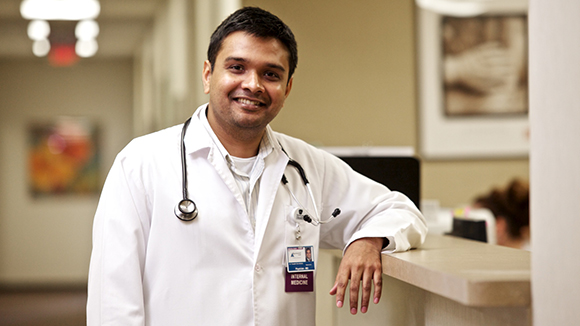
National HIV Testing Day is on June 27. According to the Centers for Disease Control, more than a million people in the United States are living with HIV, and one out of five HIV-positive Americans are unaware of their infection. Dr. Raghavendra Tirupathi, medical director of Keystone Infectious Diseases and the Keystone Health HIV program, says learning about HIV and how it’s acquired is the best prevention.
What’s the difference between HIV and AIDS?
HIV, or Human Immunodeficiency Virus, damages a person’s body by destroying specific blood cells which are crucial to help the body fight disease. If left untreated, HIV can develop into AIDS (Acquired Immune Deficiency Syndrome). This stage of HIV leaves person’s immune system is severely damaged and those affected have difficulty fighting disease and certain cancers.
What are some myths about HIV?
There is a lot of misinformation about this virus. People need to know that HIV is not spread by saliva, kissing, shaking hands or sharing utensils. It is not spread through insect bites, air or water. It is completely safe to have close contact with people who are HIV-positive, as long as you are not having unprotected sex or sharing IV drug needles.
How can I protect myself from HIV?
It is important to make sure you practice safe sex. HIV is transmitted through sex with either a man or woman without the use of condoms. Never share needles as HIV can also be spread through using IV drugs or having a partner who uses IV drugs. Pregnant women can pass HIV to their baby by pregnancy or through breastfeeding, so HIV-positive women need to receive extra medical care during pregnancy. When getting tattoos or body piercing, make sure you are getting them from a licensed facility as there is a potential risk for HIV if procedures are done in an unsterile way.
Do I need to be tested?
Everyone between the ages of 13 and 64 should be tested at least once in their lifetime, even if you don’t think you are at risk. For those who have had more than one sexual partner in the last six months, have a history of sexually transmitted disease in the last year or have a history of IV drug use, you should be tested at least once every year. For those who have high risk-sexual behaviors, multiple partners, have sex in exchange for money or use injection drugs, testing is recommended every three to six months.
Where can I go to get tested?
In Franklin County, free and confidential HIV testing is provided on a walk-in basis at the following places and times. No appointment is needed; you can simply walk in during business hours:
Keystone Internal Medicine at 830 Fifth Avenue Suite 201, Chambersburg from Monday – Friday 9 am – 4:30 pm
Keystone Community Outreach 455 Lincoln Way East, Chambersburg from Monday through Friday 9 am – 4:30 pm, and on Tuesdays from 9 am – 5:30 pm
The testing is very quick—it only takes a few minutes and results are ready in less than half an hour. This non-invasive test is done by simply swabbing the gums—no blood is involved. No appointment is needed; you can simply walk in during business hours.
Free Testing Event
In honor of National HIV Testing day, a free event will be held at Chambersburg Walgreen’s (949 Lincoln Way East) on Thursday June 27 from 10 am – 7 pm. In addition to free testing, counselors will also be in attendance to answer questions about HIV awareness and prevention.
Getting tested is the only way to know your status. There is help available in our community for those who are HIV positive. The Keystone Health HIV Program provides medical and support services to HIV positive individuals. If HIV is detected early and treated, you can expect a higher quality of life and a longer life
This article contains general information only and should not be used as a substitute for professional diagnosis, treatment or care by a qualified health care provider.




